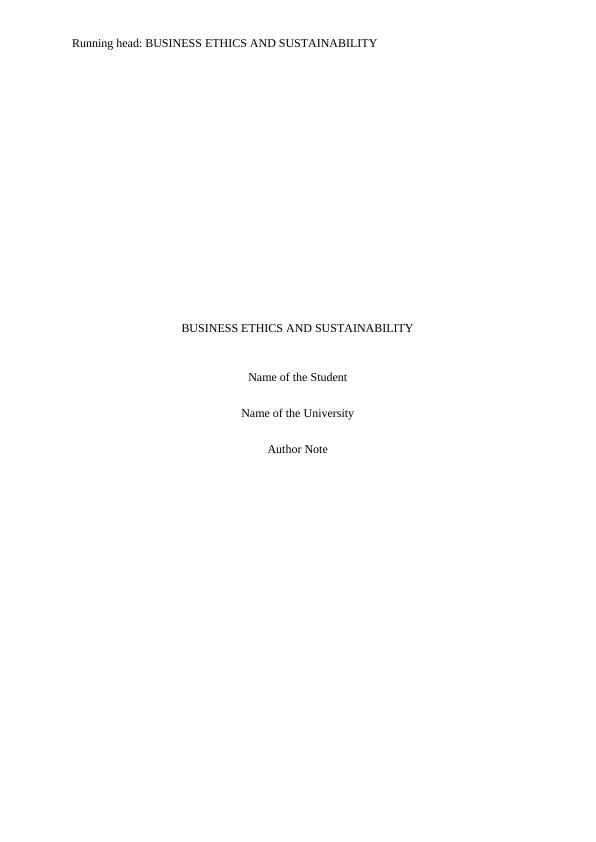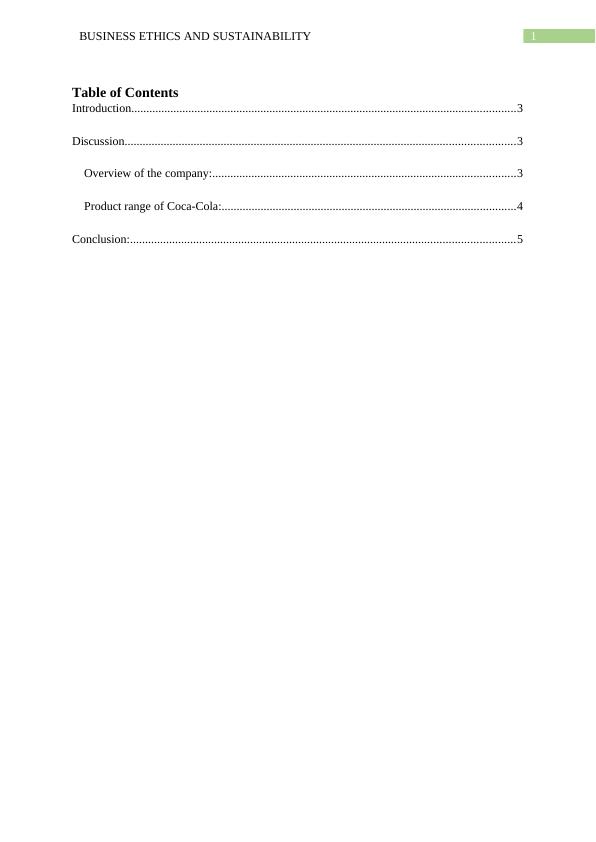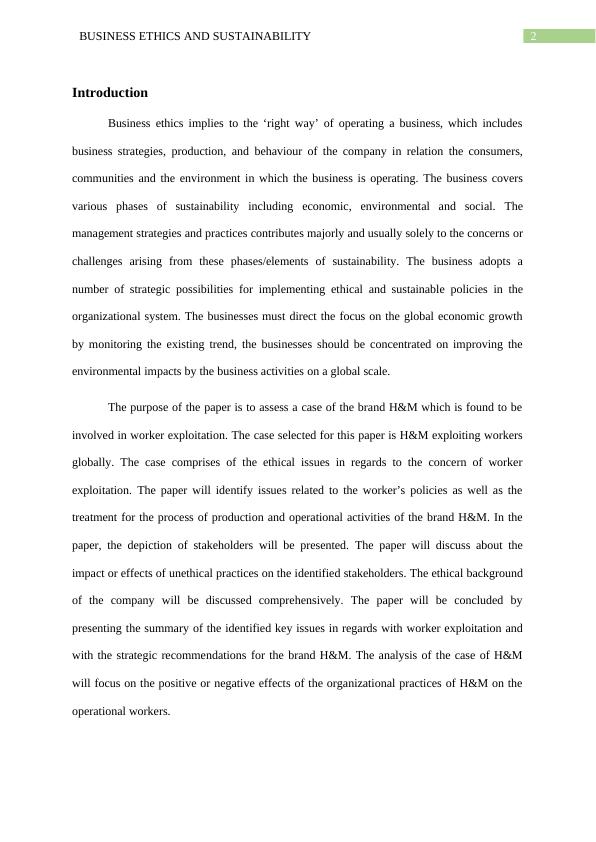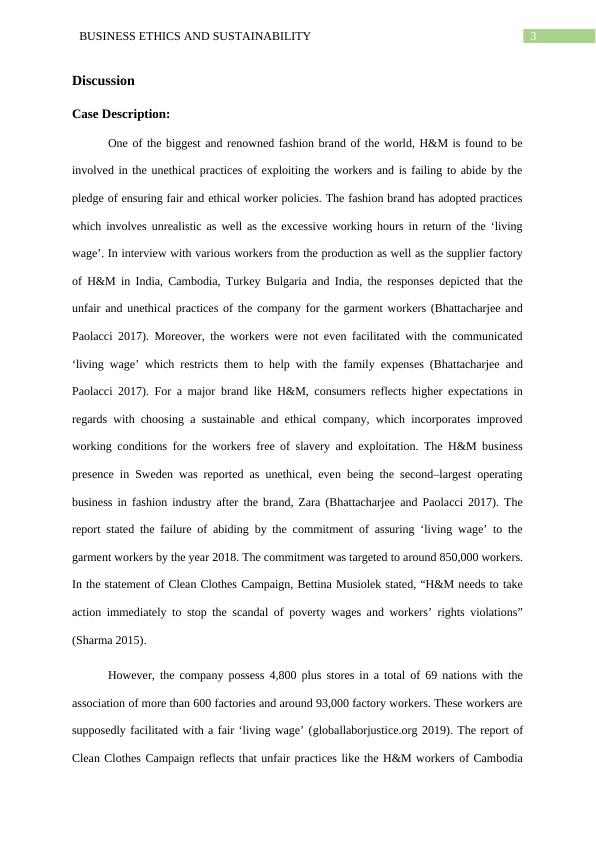Business Ethics and Sustainability
Added on 2023-03-31
15 Pages3400 Words308 Views
Running head: BUSINESS ETHICS AND SUSTAINABILITY
BUSINESS ETHICS AND SUSTAINABILITY
Name of the Student
Name of the University
Author Note
BUSINESS ETHICS AND SUSTAINABILITY
Name of the Student
Name of the University
Author Note

1BUSINESS ETHICS AND SUSTAINABILITY
Table of Contents
Introduction................................................................................................................................3
Discussion..................................................................................................................................3
Overview of the company:.....................................................................................................3
Product range of Coca-Cola:..................................................................................................4
Conclusion:................................................................................................................................5
Table of Contents
Introduction................................................................................................................................3
Discussion..................................................................................................................................3
Overview of the company:.....................................................................................................3
Product range of Coca-Cola:..................................................................................................4
Conclusion:................................................................................................................................5

2BUSINESS ETHICS AND SUSTAINABILITY
Introduction
Business ethics implies to the ‘right way’ of operating a business, which includes
business strategies, production, and behaviour of the company in relation the consumers,
communities and the environment in which the business is operating. The business covers
various phases of sustainability including economic, environmental and social. The
management strategies and practices contributes majorly and usually solely to the concerns or
challenges arising from these phases/elements of sustainability. The business adopts a
number of strategic possibilities for implementing ethical and sustainable policies in the
organizational system. The businesses must direct the focus on the global economic growth
by monitoring the existing trend, the businesses should be concentrated on improving the
environmental impacts by the business activities on a global scale.
The purpose of the paper is to assess a case of the brand H&M which is found to be
involved in worker exploitation. The case selected for this paper is H&M exploiting workers
globally. The case comprises of the ethical issues in regards to the concern of worker
exploitation. The paper will identify issues related to the worker’s policies as well as the
treatment for the process of production and operational activities of the brand H&M. In the
paper, the depiction of stakeholders will be presented. The paper will discuss about the
impact or effects of unethical practices on the identified stakeholders. The ethical background
of the company will be discussed comprehensively. The paper will be concluded by
presenting the summary of the identified key issues in regards with worker exploitation and
with the strategic recommendations for the brand H&M. The analysis of the case of H&M
will focus on the positive or negative effects of the organizational practices of H&M on the
operational workers.
Introduction
Business ethics implies to the ‘right way’ of operating a business, which includes
business strategies, production, and behaviour of the company in relation the consumers,
communities and the environment in which the business is operating. The business covers
various phases of sustainability including economic, environmental and social. The
management strategies and practices contributes majorly and usually solely to the concerns or
challenges arising from these phases/elements of sustainability. The business adopts a
number of strategic possibilities for implementing ethical and sustainable policies in the
organizational system. The businesses must direct the focus on the global economic growth
by monitoring the existing trend, the businesses should be concentrated on improving the
environmental impacts by the business activities on a global scale.
The purpose of the paper is to assess a case of the brand H&M which is found to be
involved in worker exploitation. The case selected for this paper is H&M exploiting workers
globally. The case comprises of the ethical issues in regards to the concern of worker
exploitation. The paper will identify issues related to the worker’s policies as well as the
treatment for the process of production and operational activities of the brand H&M. In the
paper, the depiction of stakeholders will be presented. The paper will discuss about the
impact or effects of unethical practices on the identified stakeholders. The ethical background
of the company will be discussed comprehensively. The paper will be concluded by
presenting the summary of the identified key issues in regards with worker exploitation and
with the strategic recommendations for the brand H&M. The analysis of the case of H&M
will focus on the positive or negative effects of the organizational practices of H&M on the
operational workers.

3BUSINESS ETHICS AND SUSTAINABILITY
Discussion
Case Description:
One of the biggest and renowned fashion brand of the world, H&M is found to be
involved in the unethical practices of exploiting the workers and is failing to abide by the
pledge of ensuring fair and ethical worker policies. The fashion brand has adopted practices
which involves unrealistic as well as the excessive working hours in return of the ‘living
wage’. In interview with various workers from the production as well as the supplier factory
of H&M in India, Cambodia, Turkey Bulgaria and India, the responses depicted that the
unfair and unethical practices of the company for the garment workers (Bhattacharjee and
Paolacci 2017). Moreover, the workers were not even facilitated with the communicated
‘living wage’ which restricts them to help with the family expenses (Bhattacharjee and
Paolacci 2017). For a major brand like H&M, consumers reflects higher expectations in
regards with choosing a sustainable and ethical company, which incorporates improved
working conditions for the workers free of slavery and exploitation. The H&M business
presence in Sweden was reported as unethical, even being the second–largest operating
business in fashion industry after the brand, Zara (Bhattacharjee and Paolacci 2017). The
report stated the failure of abiding by the commitment of assuring ‘living wage’ to the
garment workers by the year 2018. The commitment was targeted to around 850,000 workers.
In the statement of Clean Clothes Campaign, Bettina Musiolek stated, “H&M needs to take
action immediately to stop the scandal of poverty wages and workers’ rights violations”
(Sharma 2015).
However, the company possess 4,800 plus stores in a total of 69 nations with the
association of more than 600 factories and around 93,000 factory workers. These workers are
supposedly facilitated with a fair ‘living wage’ (globallaborjustice.org 2019). The report of
Clean Clothes Campaign reflects that unfair practices like the H&M workers of Cambodia
Discussion
Case Description:
One of the biggest and renowned fashion brand of the world, H&M is found to be
involved in the unethical practices of exploiting the workers and is failing to abide by the
pledge of ensuring fair and ethical worker policies. The fashion brand has adopted practices
which involves unrealistic as well as the excessive working hours in return of the ‘living
wage’. In interview with various workers from the production as well as the supplier factory
of H&M in India, Cambodia, Turkey Bulgaria and India, the responses depicted that the
unfair and unethical practices of the company for the garment workers (Bhattacharjee and
Paolacci 2017). Moreover, the workers were not even facilitated with the communicated
‘living wage’ which restricts them to help with the family expenses (Bhattacharjee and
Paolacci 2017). For a major brand like H&M, consumers reflects higher expectations in
regards with choosing a sustainable and ethical company, which incorporates improved
working conditions for the workers free of slavery and exploitation. The H&M business
presence in Sweden was reported as unethical, even being the second–largest operating
business in fashion industry after the brand, Zara (Bhattacharjee and Paolacci 2017). The
report stated the failure of abiding by the commitment of assuring ‘living wage’ to the
garment workers by the year 2018. The commitment was targeted to around 850,000 workers.
In the statement of Clean Clothes Campaign, Bettina Musiolek stated, “H&M needs to take
action immediately to stop the scandal of poverty wages and workers’ rights violations”
(Sharma 2015).
However, the company possess 4,800 plus stores in a total of 69 nations with the
association of more than 600 factories and around 93,000 factory workers. These workers are
supposedly facilitated with a fair ‘living wage’ (globallaborjustice.org 2019). The report of
Clean Clothes Campaign reflects that unfair practices like the H&M workers of Cambodia

End of preview
Want to access all the pages? Upload your documents or become a member.
Related Documents
Management sustainable Operations and Project Assignmentlg...
|5
|624
|36
Ethical business strategy of H&M Fashion PDFlg...
|6
|1540
|201
Unethical Practices in Australian Fashion Brandslg...
|10
|2120
|66
Social Responsibility of Businesslg...
|12
|3891
|29
Unethical Practices in Australian Fruit Supplier Companylg...
|9
|1755
|93
International Management and Ethics : Reportlg...
|3
|695
|265
